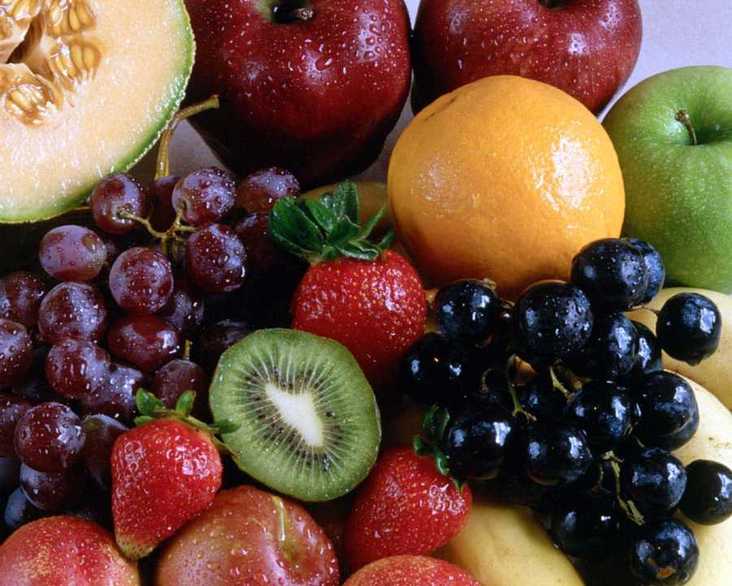Advantages Of Mango

Health benefits of Mangoes
- Mango fruit is rich in pre-biotic dietary fiber, vitamins, minerals and poly-phenolic flavonoid antioxidant compounds.
- According to new research study, mango fruit has been found to protect against colon, breast, leukemia and prostate cancers. Several trial studies suggest that polyphenolic anti-oxidant compounds in mango are known to offer protection against breast and colon cancers.
- Mango fruit is an excellent source of Vitamin-A and flavonoids like beta-carotene, alpha-carotene,and beta-cryptoxanthin. 100 g of fresh fruit provides 765 mg or 25% of recommended daily levels of vitamin A. Together; these compounds are known to have antioxidant properties and are essential for vision. Vitamin A is also required for maintaining healthy mucus membranes and skin. Consumption of natural fruits rich in carotenes is known to protect body from lung and oral cavity cancers.
- Fresh mango is a very rich source of potassium. Potassium in an important component of cell and body fluids that helps controlling heart rate and blood pressure.
- It is also a very good source of vitamin-B6 (pyridoxine), vitamin-C and vitamin-E. Consumption of foods rich in vitamin C helps body develop resistance against infectious agents and scavenge harmful oxygen free radicals. Vitamin B-6 or pyridoxine is required for GABA hormone production in the brain. It also controls homocystiene levels in the blood, which may otherwise be harmful to blood vessels resulting in CAD and stroke.
- Copper is a co-factor for many vital enzymes, including cytochrome c-oxidase and superoxide dismutase (other minerals function as co-factors for this enzyme are manganese and zinc). Copper is also required for the production of red blood cells.
- Mango peels are also rich in phytonutrients, such as the pigment antioxidants like carotenoids and polyphenols.
Vitamin A deficiency
The FAO estimates, that about 250 Million people - mainly small children and pregnant women - are threatened by vitamin A deficiency. Lack of vitamin A is associated with malnutrition and leads to break down of body defense and partial or full blindness (Xerophthalmia). Dysenteria or measles complications and mortality decreases significantly when vitamin A is given. The WHO advices the supply of vitamin A in every case of measles.
Vitamin A plays an important role in the development of the placenta and the fetus. It influences the growth, the metabolism of skin, mucus membranes, teeth and retina.
Mango is an excellent natural source for pro-vitamin A; the content rises even after being picked before ripening (Aina). Improving the consumption of mangoes would cover the needs of the population in third world countries (Favaro). The content of carotenes is very high also in the dried fruit, and retains high levels over at least six months after harvest (Pott).
The FAO and the WHO use three strategies to fight lack of Vitamin A:
Food fortification - e.g. margarine containing vitamin A in the Philippines
Supplementation: Administration of high-dose vitamin A-capsules twice a year
Food based projects - e.g. in Bangladesh (vines, beans, pumpkins, bottle-gourds), in Thailand (ivy gourd) an in many African countries (dried mango slices).
Carotenes are a strong antioxidants and scavenges radicals which otherwise could lead to cancer.
Anemia from lack of iron
The vitamin C in the mango enhances the absorption of iron from vegetable food like e.g. rice, and so prevents anemia in vegetarians (Ballot)
The following mango remedies are partially adopted from the Unani medicine system:
Beauty Aids
Taking Mango regularly makes the complexion fair and the skin soft and shining
Bleeding
Because of it's content in Vitamin C and Calcium the Mango tightens the capillary vessels and prevents oder cures bleedings of inner parts.
Burns
Burnt ashes of Mango leaves applied on the burnt parts give quick relief
Children's eating soil
Feeding the powder of dried kernel of Mango seeds with fresh water cures the habit of eating soil in kinds
Diarrhea
Sun dried Mango leaves powdered, 2-3 x a day half a teaspoon with water
Dry cough
Roast a ripe Mango on hot sand in a pan. Draw out the the juice of this Mango eliminates all the bronchial congestion and gives relief in cough. According to Hakeem Hashmi sucking the juice and not eating cut mangos is better for health and some note of caution about Mango eating
Fever
Paste of Mango roots applied on palms & soles cures fever
Gall & Kidney Stones
Dried and powdered Mango leaves, 10g a day in water (kept overnight in a tumbler) helps throwing stones out
Gastritis
In India a decoction of the mango peel is given to people with inflammation of the stomach mucus membranes.
Mental Weakness over come with mango juice
Mango contains a lot of glutamine acid - an important protein for concentration and memory. Taking _ cup sweet Mango juice with 25 grams curd and tsp. Ginger juice 2 or 3 times a day controls loose motions. Boil 20 grams powder of Mango bark in a liter of water and reduce it to 250 gram. Taking this decoction with 1 gram of black salt cures diarrhea.
Pregnancy
A pregnant woman should eat at least one mango a day - the calcium and magnesium of the mango relaxes the muscles, relieves stress and prevents abortion.
Teeth Problems
Dried Mango seeds is a good toothpaste, strengthens the gums and helps in curing dental problems foul smell pyorrhoea
Some say that the fruit which Eva picked from the tree of recognition was a mango. Couldn't it be like that?
The average content of one Mango (250 g) is (compared with other fruits):
1,5 g protein
1 g fat
30 g carbohydrates
3 g carotenes (only muskmelons have more). One Mango supplies more than the daily need of this precursor of Vitamin A
110 g vitamin B1
125 g vitamin B2 (only passion-fruit has more)
2 mg vitamin B3 (only passion-fruit and guava have more)
90 ?g folic acid (only oranges and grapes have more)
90 mg vitamin C (only orange and papaya have more)
30 mg calcium (only mandarine and orange have more)
45 mg magnesium (only papaya and banana have more)
1 mg iron (granadilla, grapes, banana, guava and apricots have more)
295g zinc (muskmelon, watermelon, papaya, guava, granadilla and bananas have more)
0,5 g potassium (muskmelon, granadilla and banana have more)
Advantages Of Apple
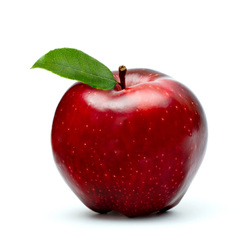
INTRODUCTION:The old saying “ to eat an apple going to bed, will make the doctor beg his bread” has been justified by its many health-rich properties. A member of the rose family, fossil remains have shown that apples were gathered and stored 5,000 years ago and it’s likely that they were already cultivated during the Neolithic times. Apples are excellent detoxifiers and apple juice can destroy viruses in the body.
In one recent study , Riu Hai Liu of Cornell University, has found although apples has only a small amount of vitamin C, eating 100 grams of apple provides the same amount of antioxidant activity as taking 1,500 milligrams of the same vitamin.
Just make sure you do not take too many apple seeds because it could be toxic if taken in large amount.
Health benefits of apple
In one recent study , Riu Hai Liu of Cornell University, has found although apples has only a small amount of vitamin C, eating 100 grams of apple provides the same amount of antioxidant activity as taking 1,500 milligrams of the same vitamin.
Just make sure you do not take too many apple seeds because it could be toxic if taken in large amount.
Health benefits of apple
- Delicious and crunchy apple is one of the popular fruit that contain an impressive list of essential nutrients, which are required for normal growth and development and overall nutritional well-being.
- Apples are low in calories; 100 g of fresh fruit slices provide only 50 calories. They are however contain no saturated fats or cholesterol; but rich in dietary fiber which helps prevent absorption of dietary LDL cholesterol in the gut. The dietary fibers also help protect the mucous membrane of the colon from exposure to toxic substances by binding to cancer causing chemicals in the colon.
- Apple fruit contains good quantities of vitamin-C and beta carotene. Vitamin C is a powerful natural antioxidant. Consumption of foods rich in vitamin C helps body develop resistance against infectious agents and scavenge harmful, pro-inflammatory free radicals from the body.
- Apples are rich in antioxidant phyto-nutrients flavonoids and polyphenols. The total measured anti-oxidant strength (ORAC value) of 100 g apple fruit is 5900 TE. The important flavonoids in apples arequercetin, epicatechin, and procyanidin B2. Apples are also good in tartaric acid that gives tart flavor to them. These compounds help body protect from deleterious effects of free radicals.
- In addition, apple fruit is a good source of B-complex vitamins such as riboflavin, thiamin and pyridoxine (vitamin B-6). Together these vitamins help as co-factors for enzymes in metabolism as well as in various synthetic functions inside the body.
- Apple also contains small amount of minerals like potassium, phosphorus and calcium. Potassium in an important component of cell and body fluids helps controlling heart rate and blood pressure; thus counters the bad influences of sodium.
Advantages Of Watermelon
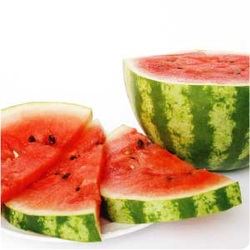
.
Health Benefit of Watermelons #1 Lycopene
Lycopene is obviously an antioxidant found in most red-colored-colored colored fruits, with the exception of a few items like bananas. Research have proven that Lycopene cuts down on chance of prostate type of cancer and coronary disease in people. People who have a diet filled up with lycopene can be a smaller sized amount vulnerable to suffer cardiovascular disease then males who don’t.
Health Good thing about Watermelons #2 Vitamin B6
Vitamin B6 is a crucial attribute to have in balanced and healthy diet because it encourages chemicals within the brain and help people to handle anxiety. They’re two mental disorders which are growing in the usa today.
Health Good thing about Watermelons #3 Ascorbic Acidity
Should you thought oranges were really the only fruit that may offer you Ascorbic Acidity, reconsider. Ascorbic Acidity is important not just to being healthy, but remaining attractive all your existence. Ascorbic Acidity improves the defense systems to ensure that you obtain sick more infrequently and also it slows lower aging and health issues as an example cataract.
Health Good thing about Watermelons #4 A Vitamin
A Vitamin works just like Ascorbic Acidity, as it might help boost immunity, it assist the body safeguard against infection. Furthermore, it prevents blindness.
As you have seen, eating watermelon is almost tantamount to having a multivitamin each day, though a much better taste. Watermelons are periodic, meaning they’re not available all climates and seasons extended. Meaning if they’re in season you need to ensure and make use.
By visiting a shop to purchase one you need to try to buy one that’s ripe plus a posture you can eat. The best approach to achieve that is always to knock concerning the outdoors within the rind. In case you hear a hollow appear then melon has the capacity to eat, however, if you hear solid thud restore it. The fruit is completed ripe and yourself defintely won’t be getting excellent flavor out of this. Buy you water melon and eat it inside the initial few occasions of configuring it home. Everything relating to this is great, and moreover, it won’t have you feeling over stuffed whenever you consume a lot of.
So in the couple of days, the weather could possibly get warmer and summer months is approaching. Remember about watermelons. Consume and find the additional boost they’ll put in healthier lifestyle.
Health Benefit of Watermelons #1 Lycopene
Lycopene is obviously an antioxidant found in most red-colored-colored colored fruits, with the exception of a few items like bananas. Research have proven that Lycopene cuts down on chance of prostate type of cancer and coronary disease in people. People who have a diet filled up with lycopene can be a smaller sized amount vulnerable to suffer cardiovascular disease then males who don’t.
Health Good thing about Watermelons #2 Vitamin B6
Vitamin B6 is a crucial attribute to have in balanced and healthy diet because it encourages chemicals within the brain and help people to handle anxiety. They’re two mental disorders which are growing in the usa today.
Health Good thing about Watermelons #3 Ascorbic Acidity
Should you thought oranges were really the only fruit that may offer you Ascorbic Acidity, reconsider. Ascorbic Acidity is important not just to being healthy, but remaining attractive all your existence. Ascorbic Acidity improves the defense systems to ensure that you obtain sick more infrequently and also it slows lower aging and health issues as an example cataract.
Health Good thing about Watermelons #4 A Vitamin
A Vitamin works just like Ascorbic Acidity, as it might help boost immunity, it assist the body safeguard against infection. Furthermore, it prevents blindness.
As you have seen, eating watermelon is almost tantamount to having a multivitamin each day, though a much better taste. Watermelons are periodic, meaning they’re not available all climates and seasons extended. Meaning if they’re in season you need to ensure and make use.
By visiting a shop to purchase one you need to try to buy one that’s ripe plus a posture you can eat. The best approach to achieve that is always to knock concerning the outdoors within the rind. In case you hear a hollow appear then melon has the capacity to eat, however, if you hear solid thud restore it. The fruit is completed ripe and yourself defintely won’t be getting excellent flavor out of this. Buy you water melon and eat it inside the initial few occasions of configuring it home. Everything relating to this is great, and moreover, it won’t have you feeling over stuffed whenever you consume a lot of.
So in the couple of days, the weather could possibly get warmer and summer months is approaching. Remember about watermelons. Consume and find the additional boost they’ll put in healthier lifestyle.
- It increases libido and prevents erectile dysfunction.
- It is rich source of antioxidants.
- Body hydration in summer achieved by few pieces of watermelon.
- It is rich in vitamin A and vitamin C.
- Lycopene is antioxidant in watermelon protects the body from cancers and heart diseases.
- It is rich in sodium and potassium and stops frequent thirst.
- It is helpful in preventing asthma and colorectal cancer.
Advantages of Melon
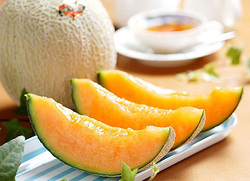
You may often underestimate the melon you eat. In fact, cheap fruit that contains many unusual properties as disease prevention. Approximately 95% of meat contains water melon, which can give a sense of cool and soothing effect. Because the character of refreshing melon can relieve heartburn in the stomach. Melon contains vitamin A, B and C and contains protein, calcium and phosphorus. Mineral content in melon can even eliminate the acidity of the body and have healing properties constipation. The acidity of the body should be removed because it would interfere with digestion, especially in the stomach organ.
Melon Nutritional was 15.00 mg of calcium; 25.00 mg of phosphorus; 0.5 mg iron; 34 mg vitamin C, 640 mg IU Vitamin A; and 0.03 mg of Vitamin B1. Melon contains an anticoagulant called adenosine, which could stop the clotting of blood cells that can lead to stroke or heart disease. Meanwhile, the carotenoid content high melon can prevent cancer and reduce the risk of lung cancer because it is the main compound attackers cancer.
The melon has a very good diuretic that can cure kidney disease and severe eczema disease and acute. When combined with lemon, it can crush the melon uric acid diseases. So you'll want to eat the melon on a regular basis once a day in the morning.
Thus, the benefits of melon for our body's health is:
1. As an anticancer.
2. Exhaust system helps to prevent constipation.
3. Reduce the risk of heart disease and stroke.
4. Prevent blood clotting.
5. Reduce the risk of kidney disease.
6. Eczema cure.
7. Prevent and cure heartburn.
Melons provide a good source of potassium and vitamin C. Like many other fruits, they are also fat and cholesterol free; high in water content; and are relatively low in calories. Many melons originated in the Middle East and their popularity was gradually spread across Europe. Of all the melons, ancient Egyptians and Romans mostly consumed cantaloupes and muskmelons. Christopher Columbus transported melon seeds to the United States and Spanish explorers eventually cultivated
Melon Nutritional was 15.00 mg of calcium; 25.00 mg of phosphorus; 0.5 mg iron; 34 mg vitamin C, 640 mg IU Vitamin A; and 0.03 mg of Vitamin B1. Melon contains an anticoagulant called adenosine, which could stop the clotting of blood cells that can lead to stroke or heart disease. Meanwhile, the carotenoid content high melon can prevent cancer and reduce the risk of lung cancer because it is the main compound attackers cancer.
The melon has a very good diuretic that can cure kidney disease and severe eczema disease and acute. When combined with lemon, it can crush the melon uric acid diseases. So you'll want to eat the melon on a regular basis once a day in the morning.
Thus, the benefits of melon for our body's health is:
1. As an anticancer.
2. Exhaust system helps to prevent constipation.
3. Reduce the risk of heart disease and stroke.
4. Prevent blood clotting.
5. Reduce the risk of kidney disease.
6. Eczema cure.
7. Prevent and cure heartburn.
Melons provide a good source of potassium and vitamin C. Like many other fruits, they are also fat and cholesterol free; high in water content; and are relatively low in calories. Many melons originated in the Middle East and their popularity was gradually spread across Europe. Of all the melons, ancient Egyptians and Romans mostly consumed cantaloupes and muskmelons. Christopher Columbus transported melon seeds to the United States and Spanish explorers eventually cultivated
Advantages Of Grapes
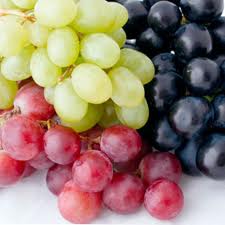
THE GREAT GRAPES
The tangy flavor provided by grapes makes it an ideal ingredient for most of the salads. Grapes are generally produced in different varieties. If you happen to choose the American variety then you can enjoy this fruit during the month of September every year. But the European variety will let you devour the fruit throughout the year. Some grapes comprise of seeds and some are seedless in nature. The seedless varieties are liked by people as they are easy to consume. The grapes with seeds are edible so it is not harmful to eat them. Yummy raisins are derived by drying the grapes. Grapes are also the primary ingredient for the preparation of wine.
Origin
During the period of 5000 BC, the grapes were originated in Asia. The people of Roman civilization started using grapes for making wines. During the second century Rhine valley became quite famous as they started producing grapes in huge quantity. Today we can find more eighty five varieties of this fruit. The beginning of the seventeenth century saw the introduction of grapes in the United States through the Spanish voyagers. The production of grapes started to thrive in the state of California because of its favorable climatic conditions. United States and Spain are considered as the highest producer of this fruit in the entire world.
Nutritional facts
It is indeed right that great things come in small sizes and the grapes testify this adage. There are a lot of ways through which grapes can be consumed. Some like to eat them raw, others might prefer them in the form of juice or wine, and some of us would like to munch them as raisins. You might be inquisitive amount the nutrients provided by this fruit. The health benefits provided by grapes weighing hundred grams are as follows:
• Calories: 69
• Fat: 0.1 g
• Calcium: 9.9 mg
• Iron: 0.3 mg
• Fiber: 1 g
• Vitamin C: 10 mg
• Potassium: 190 mg
• Sugars: 15 g
• Carbohydrates: 18.5 g
• Magnesium: 6.9 mg
• Protein: 0.8 g
• Zinc: 0.06 mg
Advantages
• The grapes contain flavonoids and this element helps in preventing heart diseases by decreasing the rate of blood clots.
• Grapes are also recommended for patients suffering from asthma.
• Grape juice is considered to be one of the most effective home remedy for treating migraine.
• Since grapes comprises of sucrose, it has got the quality of a laxative in it and thus it is helpful for patients experiencing constipation.
• Grapes are also used to treat an upset stomach.
• When we get tired the iron content in our body starts to diminish and to recover this loss one should take (white) grape juice.
• Antioxidants are an integral part of grapes and by the help of the antioxidants we can have a healthy immune system.
Disadvantages
• Black grapes should not be consumed when a person is feeling tired as the juice of black grapes reduces the quantity of iron in the body and makes the person feel extremely weak.
The tangy flavor provided by grapes makes it an ideal ingredient for most of the salads. Grapes are generally produced in different varieties. If you happen to choose the American variety then you can enjoy this fruit during the month of September every year. But the European variety will let you devour the fruit throughout the year. Some grapes comprise of seeds and some are seedless in nature. The seedless varieties are liked by people as they are easy to consume. The grapes with seeds are edible so it is not harmful to eat them. Yummy raisins are derived by drying the grapes. Grapes are also the primary ingredient for the preparation of wine.
Origin
During the period of 5000 BC, the grapes were originated in Asia. The people of Roman civilization started using grapes for making wines. During the second century Rhine valley became quite famous as they started producing grapes in huge quantity. Today we can find more eighty five varieties of this fruit. The beginning of the seventeenth century saw the introduction of grapes in the United States through the Spanish voyagers. The production of grapes started to thrive in the state of California because of its favorable climatic conditions. United States and Spain are considered as the highest producer of this fruit in the entire world.
Nutritional facts
It is indeed right that great things come in small sizes and the grapes testify this adage. There are a lot of ways through which grapes can be consumed. Some like to eat them raw, others might prefer them in the form of juice or wine, and some of us would like to munch them as raisins. You might be inquisitive amount the nutrients provided by this fruit. The health benefits provided by grapes weighing hundred grams are as follows:
• Calories: 69
• Fat: 0.1 g
• Calcium: 9.9 mg
• Iron: 0.3 mg
• Fiber: 1 g
• Vitamin C: 10 mg
• Potassium: 190 mg
• Sugars: 15 g
• Carbohydrates: 18.5 g
• Magnesium: 6.9 mg
• Protein: 0.8 g
• Zinc: 0.06 mg
Advantages
• The grapes contain flavonoids and this element helps in preventing heart diseases by decreasing the rate of blood clots.
• Grapes are also recommended for patients suffering from asthma.
• Grape juice is considered to be one of the most effective home remedy for treating migraine.
• Since grapes comprises of sucrose, it has got the quality of a laxative in it and thus it is helpful for patients experiencing constipation.
• Grapes are also used to treat an upset stomach.
• When we get tired the iron content in our body starts to diminish and to recover this loss one should take (white) grape juice.
• Antioxidants are an integral part of grapes and by the help of the antioxidants we can have a healthy immune system.
Disadvantages
• Black grapes should not be consumed when a person is feeling tired as the juice of black grapes reduces the quantity of iron in the body and makes the person feel extremely weak.
Advantages Of Oranges

Health benefits of oranges
Orange is Beneficial in the following cases :
Nutritional Contents of Orange :
Nutritive Values : Per 100 gm.
- Nutrients in oranges are plentiful and diverse. The fruit is low in calories, contains no saturated fats or cholesterol, but is rich in dietary fiber, pectin, which is very effective in persons with excess body weight. Pectin, by its action as bulk laxative, helps to protect the mucous membrane of the colon by decreasing its exposure time to toxic substances as well as by binding to cancer causing chemicals in the colon. Pectin has also been shown to reduce blood cholesterol levels by decreasing its re-absorption in the colon by binding to bile acids in the colon.
- Oranges, like other citrus fruits, is an excellent source of vitamin C (provides about 60% of DRI); Vitamin C is a powerful natural antioxidant. Consumption of foods rich in vitamin C helps body develop resistance against infectious agents and also, scavenge harmful, pro-inflammatory free radicals from the blood.
- Orange fruit contains a variety of phytochemicals. Hesperetin and Narigenin are flavonoids found in citrus fruits. Naringenin is found to have a bio-active effect on human health as antioxidant, free radical scavenger, anti-inflammatory, and immune system modulator. This substance has also been shown to reduce oxidant injury to DNA in vitro studies.
- Oranges also contain very good levels of vitamin A, and other flavonoid antioxidants such as alpha andbeta carotenes, beta-cryptoxanthin, zea-xanthin and lutein. These compounds are known to have antioxidant properties. Vitamin A also required for maintaining healthy mucus membranes and skin and is also essential for vision. Consumption of natural fruits rich in flavonoids helps body to protect from lung and oral cavity cancers.
- It is also a very good source of B-complex vitamins such as thiamin, pyridoxine and folates. These vitamins are essential in the sense that body requires them from external sources to replenish.
- Orange fruit also contains a very good amount of minerals like potassium and calcium. Potassium in an important component of cell and body fluids helps control heart rate and blood pressure.
Orange is Beneficial in the following cases :
- Asthma
- Bronchitis
- Tuberculosis
- Pneumonia
- Rheumatism
- Prevent kidney stone
- Helps lower cholesterol
- Helps prevent diabetes
- Arthritis
- High blood pressure
- Persons addicted to alcohol have found that the desire for liquor is greatly reduced by drinking of orange juice.
- Consumption of large quantities of oranges will decrease the outpouring of mucus secretions from the nose.
Nutritional Contents of Orange :
- Betacarotene, another powerful antioxidant that protects our cells from being damage.
- Calcium that helps protect and maintain the health of our bone and teeth.
- Folic Acid for proper brain development.
- Magnesium helps maintain blood pressure.
- Potassium helps maintain electrolyte balance in the cells, and is important in maintaining a healthy cardiovascular system.
- Thiamin helps to convert food into energy.
- Vitamin B6 helps support the production of hemoglobin that carries oxygen to all parts of the body.
Nutritive Values : Per 100 gm.
- Vitamin A : 190 I.U.
- Vitamin B : Thiamine .08 mg.;
- Vitamin C : 49 mg.
- Calcium : 33 mg.
- Phosphorus : 23 mg.
- Potassium : 300 mg.
Advantages Of Banana
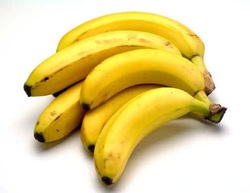
Partly because they aid in the body's retention of calcium, nitrogen, and phosphorus, which all work to build sound and regenerated tissues, the medical benefits of bananas are many. The following paragraphs will discuss some of the medical benefits of bananas.
One of the medical benefits of bananas is they can be used to fight against intestinal disorders, including ulcers. Bananas are one of the only fruits that can be safely consumed by ulcer patients. Bananas neutralize the acidity of gastric juices, thus reducing ulcer irritation by coating the lining of the stomach. Not only can bananas relieve painful systems of ulcers, and other intestinal disorders, but they can also promote healing.
Another of the many medical benefits of bananas includes using them as a treatment for burns and wounds. By beating a ripe banana into a pasty substance, and spreading it over a burn or wound, it can give immediate pain relief! The banana paste should be covered by a cloth bandage for best results. Even the leaves of a banana tree can be used as a cool compress for burns or wounds.
Other medical benefits of bananas include aiding in:
- constipation and diarrhea relief
- treatment of arthritis
- treatment of anemia
Advantages of Banana fruit
Bananas is not only refrigeratoring fruit. Science says, never store banana in refrigerator.
Bananas contain three natural sugars - sucrose, fructose and glucose combined with fiber. A banana gives an instant, sustained and substantial boost of energy.
Research has proven that just two bananas provide enough energy for a strenuous 90-minute workout. No wonder the banana is the number one fruit with the world's leading athletes.
It can also help overcome or prevent a substantial number of illnesses and conditions, making it a must to add to our daily diet.
According to a recent survey undertaken amongst people suffering from depression, many felt much better after eating a banana.
It contains vitamin B6, regulates blood glucose levels, which can affect your mood.
Bananas have a natural antacid effect in the body, so if you suffer from heartburn, try eating a banana for soothing relief.
Bananas can also help people trying to give up smoking. Bananas potassium is a vital mineral, which helps normalize the heartbeat, sends oxygen to the brain and regulates your body's water balance.
Many people find it amazingly successful at reducing swelling and irritation (for insect bit).
In Thailand, for example, pregnant women eat bananas to ensure their baby is born with a cool temperature.
Advantages Of Strawberry
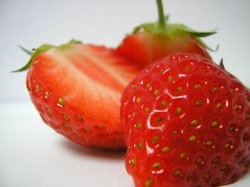
Health Benefits of the StrawberryWe all know strawberries are delicious, but they are also nutritious, and ideally should be a part of everyone's daily diet. You'll enjoy some health advantages by eating strawberries regularly, and the best part is strawberries are one of the most delicious fruits.
The USDA recommends that every American eat at least five servings of fresh fruits and vegetables daily, but unfortunately, most people don't even come close to that. Adding fresh strawberries to your diet, whether they are in salads, smoothies, or on their own, is a great way to get the servings of fruit you need for a well-rounded body and a healthy immune system.
What's so nutritionally good about strawberries?
Strawberries contain a range of nutrients, with vitamin C heading the group. They also contain significant levels of phytonutrients and antioxidants, which fight free radicals. These antioxidant properties are believed to be linked to what makes the strawberry bright red.
So what are these weird free radicals? Free radicals are elements that can damage cells, and they are thought to contribute to the formation of many kinds of cancer.
In addition to vitamin C, strawberries also provide an excellent source of vitamin K and manganese, as well as folic acid, potassium, riboflavin, vitamin B5, vitamin B6, copper, magnesium, and omega-3 fatty acids.
So many uses for strawberries!
Strawberries are among the most versatile of fresh fruits. Unfortunately, they are quite perishable as well. So purchase fresh strawberries only a few days before they are to be eaten. When strawberries are in season locally this is rarely a problem. But at other times of the year, it may be necessary to make due with frozen strawberries, which lose much if not all of their nutrition.
At the produce section choose strawberries that are plump firm and free of mold and have a deep red color. Unlike other fruits, strawberries do not continue to ripen after they are picked, so be sure to choose the ripest, reddest strawberries, as they will provide the best taste and the highest nutrient density. Many people find that medium sized strawberries are sweeter and more flavorful than larger ones. When buying pre-packaged strawberries, be sure that the berries have not been packed too tightly, as this could cause them to be crushed or otherwise damaged.
Handle strawberries properly and store them well after they have been purchased. Like all fruit, strawberries should be washed thoroughly prior to eating or storage. Any strawberries that show signs of mold should be discarded at once, as they will contaminate the remaining strawberries. The strawberries should be placed in a bowl, covered with plastic wrap, and kept in the refrigerator. Fresh strawberries will keep in the fridge for a few days.
Its Curing.
" AT LAST MORE YOU EAT SO MORE YOU COMPETE"
The USDA recommends that every American eat at least five servings of fresh fruits and vegetables daily, but unfortunately, most people don't even come close to that. Adding fresh strawberries to your diet, whether they are in salads, smoothies, or on their own, is a great way to get the servings of fruit you need for a well-rounded body and a healthy immune system.
What's so nutritionally good about strawberries?
Strawberries contain a range of nutrients, with vitamin C heading the group. They also contain significant levels of phytonutrients and antioxidants, which fight free radicals. These antioxidant properties are believed to be linked to what makes the strawberry bright red.
So what are these weird free radicals? Free radicals are elements that can damage cells, and they are thought to contribute to the formation of many kinds of cancer.
In addition to vitamin C, strawberries also provide an excellent source of vitamin K and manganese, as well as folic acid, potassium, riboflavin, vitamin B5, vitamin B6, copper, magnesium, and omega-3 fatty acids.
So many uses for strawberries!
Strawberries are among the most versatile of fresh fruits. Unfortunately, they are quite perishable as well. So purchase fresh strawberries only a few days before they are to be eaten. When strawberries are in season locally this is rarely a problem. But at other times of the year, it may be necessary to make due with frozen strawberries, which lose much if not all of their nutrition.
At the produce section choose strawberries that are plump firm and free of mold and have a deep red color. Unlike other fruits, strawberries do not continue to ripen after they are picked, so be sure to choose the ripest, reddest strawberries, as they will provide the best taste and the highest nutrient density. Many people find that medium sized strawberries are sweeter and more flavorful than larger ones. When buying pre-packaged strawberries, be sure that the berries have not been packed too tightly, as this could cause them to be crushed or otherwise damaged.
Handle strawberries properly and store them well after they have been purchased. Like all fruit, strawberries should be washed thoroughly prior to eating or storage. Any strawberries that show signs of mold should be discarded at once, as they will contaminate the remaining strawberries. The strawberries should be placed in a bowl, covered with plastic wrap, and kept in the refrigerator. Fresh strawberries will keep in the fridge for a few days.
Its Curing.
- Eye Care: The primary reasons for almost all the problems of eyes are free radicals and deficiency of certain nutrients. With the growing age and lack of these protective nutrients, the harmful oxidants or free radicals cast heavy damage on our eyes, such as drying up of eyes, degeneration of optical nerves, Macular degeneration, vision defects and make them prone to infections too. The anti oxidants such as vitamin-C, Flavonoids, Phenolic Phytochemicals and Elagic Acid, present in strawberries can help avoid this situation to a great extent. One more factor is ocular pressure, i.e. the pressure of the eyes. Any disturbance in it is also harmful for the eyes. Here too, strawberries are helpful as they contain potassium, which help maintain right pressure.
- Arthritis and Gout: The degeneration of muscles and tissues, drying up of the fluid which help mobility of the joints and accumulation of toxic substances and acids (such as uric acid) in the body are some of the ill effects of free radicals present in our body, which are primarily responsible for Arthritis and Gout. Strawberries, with their team of anti oxidants and detoxifiers, can effectively help push away such health hazards forever. It is a famous saying in India that a serving of any fruit a day will remove the rust from the joints. It is very true for strawberries.
- Cancer: Vitamin-C, Folate and Anthocyanin, Quercetin and Kaempferol (few of the many Flavonoids in strawberries which possess excellent anti oxidant and anti carcinogenic properties) together form an excellent team to fight cancer and tumor. A daily intake of strawberries is seen to have remarkably brought down the growth of cancerous cells.
- Brain Function: It is a very common observation that old people tend to lose their memory and control over their activities, limbs etc. This is because of aging of their brain and the nervous system. Actually, the free radicals, the agents very much responsible for aging, have a very adverse effect on these systems. Due to them, the brain tissues start degenerating and the nerves get weaker. Strawberries can help you out. The vitamin-C and the phytochemicals in them neutralize the effect of these oxidants and also rejuvenate the system. One more thing, strawberries are rich in iodine too, which is very helpful for proper functioning of the brain and nervous system.
- High Blood Pressure: Strawberries are very good in potassium and magnesium content, both of which are very effective in lowering high blood pressure caused by sodium.
- Heart Diseases: High fiber, Folate, no fats and high anti oxidants such as vitamin-C and those phytochemicals (Flavonoids) together form an ideal cardiac health pack, as they effectively reduce cholesterol. Some of the members of the vitamin-B family present in strawberries also strengthen the cardiac muscles and help better functioning of the heart.
- Other Benefits: Folate is known to protect from birth-defects. Vitamin-C effectively prevents from infections and cold. The phytonutrients also have anti inflammatory properties. Wait! I forgot to tell you about the best benefit. The strawberry preserve tastes just awesome
" AT LAST MORE YOU EAT SO MORE YOU COMPETE"
